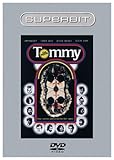Tommy

Amazon.co.uk Review
If you’ve ever wanted to hear Jack Nicholson sing (or try to) or marvel at the sight of Ann-Margret drunkenly cavorting in a cascade of baked beans, Tommy is the movie you’ve been waiting for. As it turns out, the Who’s brilliant rock opera is sublimely matched to director Ken Russell’s penchant for cinematic excess, and this 1975 production finds Russell at the peak of his filmmaking audacity. It’s a fever-dream of musical bombast, custom-fit to the thematic ambition of Pete Townshend’s epic rock drama, revolving around the titular “deaf, dumb, and blind kid” (played by Who vocalist Roger Daltrey) who survives the childhood trauma that stole his senses to become a Pinball Wizard messiah in Townshend’s grandiose attack on the hypocrisy of organised religion.
The story is remarkably coherent considering the hypnotic dream-state induced by Russell’s visuals. Tommy’s odyssey is rendered through wall-to-wall music, each song representing a pivotal chapter in Tommy’s chronology, from the bloodstream shock of “The Acid Queen” (performed to the hilt by Tina Turner) to Nicholson’s turn as a well-intentioned physician, Elton John’s towering rendition of “Pinball Wizard” and Daltrey’s epiphanous rendition of “I’m Free”. Other performers include Eric Clapton and (most outrageously) the Who’s drummer Keith Moon, and through it all Russell is almost religiously faithful to Townshend’s artistic vision. Although it divided critics when first released, Tommy now looks likes a minor classic of gonzo cinema, worthy of the musical genius that fuelled its creation. –Jeff Shannon Amazon.co.uk Review
Even by the standards of a genre not characterised by restraint, the 1974 rock opera Tommy is endearingly barmy, a bizarre combination of Pete Townshend’s disturbed inspiration and director Ken Russell’s wildly eccentric vision. Even if you gamely try and read allegorical meaning into it, the story is frankly odd: a child becomes psychosomatically deaf, dumb and blind after witnessing the murder of his father by his stepdad and goes on to become rich and famous as the world pinball champion (since when was pinball a world-class competitor sport?), before setting himself up as a latter-day messiah. It’s about the travails of the post-war generation, the disaffection of youth, the trauma of childhood abuse, the sham nature of new-age cults, and many other things besides. At least, that’s what Townshend and Russell would have you believe. But what’s really important is the many wonderful, utterly bonkers set-pieces–effectively a string of pop videos–that occur along the way, performed by great guest stars: Tina Turner as the Acid Queen, Eric Clapton as the Preacher, Keith Moon as Uncle Ernie, Elton John’s mighty rendition of “Pinball Wizard”, even Jack Nicholson doing a turn as a suave specialist.
Roger Daltrey is iconic in his signature role, and Oliver Reed makes up for a complete inability to sing with a bravura performance as his sleazy stepdad, but best of all is Ann-Margret as Tommy’s mother Nora: her charismatic presence holds the loose narrative together and she richly deserved her Academy Award nomination; the sight of her in a nylon cat suit being drenched in baked beans and chocolate from an exploding TV set is worth the price of admission alone.
On the DVD: Tommy comes to DVD in a two-disc set, with the feature on disc one accompanied by three audio tracks: Dolby Stereo or 5.1 surround, as well as the original “Quintaphonic” surround mix–a unique experience with effectively two pairs of stereo tracks plus a centre track for the vocals. The anamorphic picture adequately recreates the original theatrical ratio. The second disc has a series of lengthy and illuminating new interviews with the main (surviving) players: Townshend, Russell, Daltrey and Ann-Margret, in which we learn among other things, that Daltrey wasn’t Townshend’s first choice for the role, that Stevie Wonder was the original preference for the Pinball Wizard, and that Ken Russell had never heard of any of these rock stars before agreeing to helm the movie. There’s also a feature on the original sound mix and its restoration for DVD. All in all, a satisfying package for fans of one of the daftest chapters in the annals of rock music. –Mark Walker